There are many reasons I hope Barack Obama wins on Tuesday. But here’s a less obvious one: the recriminations will be more interesting.

If Obama loses, I suspect the dominant critique will be that he never said what he’d do in his second term, at least until it was too late. Like Bill Clinton in 1996, he tried to paint his Republican opponent as an extremist who would eviscerate the government programs middle-class Americans love. But unlike Clinton, who promised a “bridge to the 21st century”—i.e., government help in surviving the dislocations caused by globalization—Obama hasn’t identified himself with any forward-looking agenda more substantive than his one-word campaign motto: “Forward.” If Obama loses, Democrats will claim Romney won because he had a plan, any plan, and that with it he stole the mantle of hope.
But while Democrats will turn on Obama, they won’t despair about their party. It will be too easy to pawn off the loss on Obama’s bad strategy and, of course, the lousy economy and to believe that Hillary Clinton can mount a restoration in 2016. A few moderate Democrats may say Obama should have tacked more to the center, as the Democratic Leadership Council did after Democratic losses in the 1980s. But the party’s DLC wing barely exists anymore. And its basic arguments no longer hold.
In the 1980s and 1990s, the DLC warned that Democrats were losing national elections because the public distrusted them on national security and racially saturated culture-war issues like welfare, the death penalty, and affirmative action. But welfare, the death penalty, and affirmative action have largely disappeared as top-tier issues, and national security no longer is a GOP strength. The DLC also warned that if Democrats didn’t move to the center, they’d never be able to contest the South and West. But chunks of the South and West have shifted toward the Democrats anyway: the former because of northern in-migration and the latter because of Hispanic immigration. And they’ll likely shift even more by 2016.
In other words, the Democrats won’t erupt in civil war if Obama loses, because Democrats believe demographic change is on their side. If Romney loses, by contrast, the recriminations will be more profound for the exact same reason. That’s not to say that if Romney wins centrists will suddenly become a powerful force in the GOP. From Hurricane Sandy to Chris Christie’s response to Hurricane Sandy, the Republican right is already readying its alibis. And more generally, conservatives will be able to say, correctly, that they never loved Mitt Romney in the first place. They’ll console themselves with the belief that in 2016 they’ll have a crop of more genuinely conservative contenders—from Marco Rubio to Paul Ryan to Chris Christie—who at least theoretically stand a better chance of winning swing votes.
So, yes, conservatives will remain ascendant. But the chances of a DLC-style ideological insurrection from the party center will still be higher in the GOP than on the Democratic side. For one thing, if Hurricane Sandy does help tip the election toward Obama, it won’t only be because at times of national catastrophe the president seems above reproach. After all, Hurricane Katrina didn’t exactly help George W. Bush. If Sandy helps Obama it will be in significant measure because he—and Democrats more generally—are identified with a competent, well-resourced federal government, which is something Americans periodically remember that they actually need.
If Romney loses, it will also be hard for Republicans to escape the fact that their inability to win Hispanics represents a mortal threat to their political future. The GOP put virtually every major Republican Hispanic office-holder on stage at this year’s convention, but it didn’t matter. And even if they put Rubio on the ticket in 2016, it still won’t matter all that much, so long as Hispanics feel the GOP’s policies are anti–Hispanic immigrant.
If Romney loses, at least some prominent Republicans will recognize that he lost the Hispanic vote because he was pushed far to the right on immigration during the primaries. And they’ll demand that the next GOP nominee avoid that trap, which will put them in conflict with the party’s activist base. As one GOP strategist told the National Journal’s Ron Brownstein this August, referring to the Romney campaign’s bid to win the White House on the back of the white Anglo vote alone, “This is the last time anyone will try to do this.”
When it the DLC was first launched, after Walter Mondale’s defeat in 1984, it tried to disempower its party’s grassroots base via stealth. It helped create “superdelegates,” which gave elected politicians a greater say in picking nominees. Democrats also altered their primary schedule to give more weight to the South, a region considered more hospitable to centrist presidential contenders. But it was only after Michael Dukakis lost in 1988 that a group of Democratic operatives and politicians, led by a young governor from Arkansas named Bill Clinton, frontally challenged the party’s liberal wing.
Even if Romney loses, the GOP may still be one election defeat away from that kind of ideological confrontation. But Romney’s defeat would bring the showdown closer as more and more Republicans ask themselves this simple question: if our party, as currently constituted, can’t beat an incumbent who has presided over the worst economy that most American voters have ever experienced, then whom exactly can we beat?






